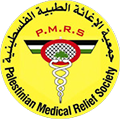 Israel’s Medical Permit Denial for Gaza’s Children Doubles
Israel’s Medical Permit Denial for Gaza’s Children Doubles
Almost 840 Palestinians died awaiting a permit to leave the besieged enclave for treatment between 2008 and 2021.
URL: https://www.middleeasteye.net/news/israel-gaza-medical-permit-denial-children-doubles-past-year
Published: 27 July 2022
URL: https://www.middleeasteye.net/news/israel-gaza-medical-permit-denial-children-doubles-past-year
Published: 27 July 2022
 Israel Refuses to Issue Long-Term Permits to Cancer Patients
Israel Refuses to Issue Long-Term Permits to Cancer Patients
Permits are granted for one day and issued late, harming the continuity of medical treatment; PHRI demands that Israel issue three-month permits to Gaza cancer patients.
URL: https://www.phr.org.il/en/226/?pr=14848
Published: 22 June 2022
URL: https://www.phr.org.il/en/226/?pr=14848
Published: 22 June 2022
On Tuesday, 16 March 2021, the Palestinian Medical Relief Society (PMRS) and Palestinian Centre for Human Rights (PCHR) issued a new report: “Social Determinants of Health in the Gaza Strip.” The report aims to address the social determinants of health and health inequalities in the Gaza Strip and to urge decision makers and stakeholders to take action in an attempt to improve health, education and housing sectors as well as social and political policies. The report informs decision makers on the impact of their decisions on the health of the Gaza Strip population.
Some notable excerpts:
- “To improve the health situation of any population, health authorities have to address the relationship between the community health status and other factors including policies, health services, and individual behavior. The population’s health is shaped not only by biological factors but also by social, environmental, economic, political, and personal factors. Therefore, improving health outcomes can be achieved by addressing and enhancing the social determinants of health (SDOH).“
- “The SDOH are ‘the circumstances, in which people are born, grow up, live, work and age, and the systems put in place to deal with illness’ (World Health Organization [WHO, 2015]). These circumstances are shaped by a wider set of forces: economics, social policies, and politics. The SDOH are mostly responsible for health inequities (HI) – the unfair and avoidable differences in health status seen within and between countries”. Health outcomes are influenced by many factors that include genetic and biological predisposition; social, political, and economic conditions; surrounding environment; education, equity, and well-balanced diversified nutrition. Inequalities in social conditions give rise to unequal and unjust health outcomes for the different social groups.“
PCHR page: https://pchrgaza.org/social-determinants-of-health-in-gaza-strip/
Download report: https://pchrgaza.org/wp-content/uploads/2021/03/Health-Determinants-EnglishWeb-1.pdf
Date Published: 16 March 2021

